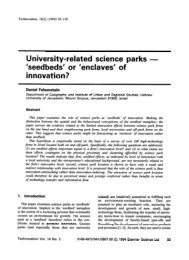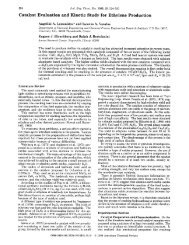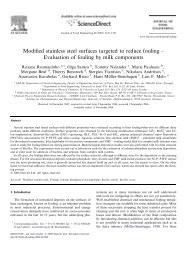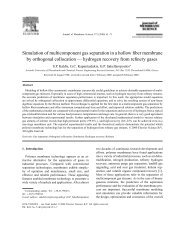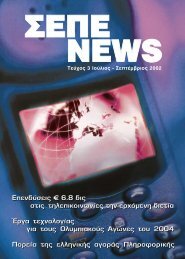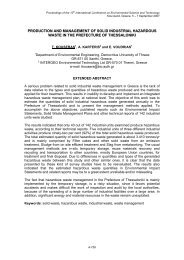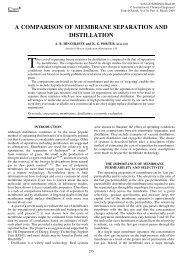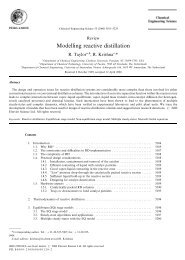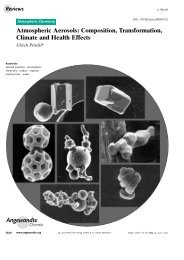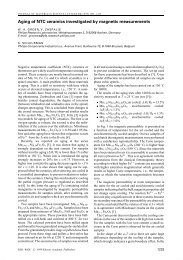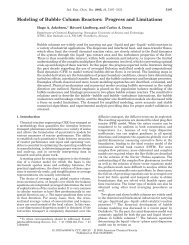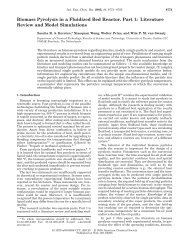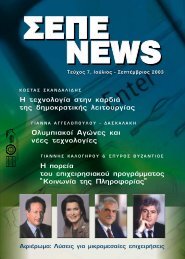RTD info - European Commission - Europa
RTD info - European Commission - Europa
RTD info - European Commission - Europa
You also want an ePaper? Increase the reach of your titles
YUMPU automatically turns print PDFs into web optimized ePapers that Google loves.
6<br />
<strong>RTD</strong> <strong>info</strong> Special Science and Media September 2002<br />
P R E S S<br />
"<br />
New Biopress prize<br />
In November, during <strong>European</strong><br />
Science and Technology Week,<br />
the <strong>European</strong> Molecular Biology<br />
Organisation (EMBO) will be<br />
awarding a prize of €5 000 to a<br />
<strong>European</strong> researcher who, through<br />
his involvement in communication<br />
activities, has contributed to a<br />
better understanding of life sciences<br />
by the public.<br />
www.embo.org<br />
To find out more<br />
about biotechnologies<br />
and the press<br />
#<strong>European</strong> Federation of<br />
Biotechnology<br />
www.kluyver.stm.tudelft.nl/efb/<br />
#Task Group of Public Perception of<br />
Biotechnology<br />
www.efbpublic.org/<br />
#Coverage of biotechnologies in<br />
the Italian press: report by the<br />
Pavia observatory:<br />
www.osservatorio.it<br />
#Dossier on communication<br />
questions in Spain<br />
www.biomeds.net/biomedia/<br />
dossier_comunicacion.htm<br />
we have made,’ estimates Olivier Hostens, director of<br />
external relations at the Facultés Notre-Dame de la Paix<br />
in Namur (Belgium). When pressed a little further, he<br />
also expressed some criticism of the attitude of university<br />
scientific circles which, he believes, often ‘resist communication,<br />
especially as they do not depend on the press<br />
for funding.’<br />
A<br />
Are researchers introverted? According<br />
to Professor Derek Burke of the Institute for Food<br />
Research in Norwich (UK), ‘there is a danger of creating a<br />
false image of science. The current critical period in relations<br />
between science and society is the result of the<br />
same public mistrust of any authority, whether politicians,<br />
the media or research.’<br />
So is it time the scientists took the initiative? Fiona Fox,<br />
director of the Science Media Centre (3) in the UK –<br />
charged with making the research community’s voice<br />
heard in the media when ‘science hits the headlines’ –<br />
tends to think so: ‘Scientists must make themselves available<br />
to the media to the same extent as certain pressure<br />
groups or NGOs.’ The latter are very quick off the mark to<br />
make documents and contacts available to journalists on<br />
the majority of ‘sensitive’ issues.<br />
This view is shared by the journalist Bernard Dixon, a<br />
microbiologist by training, who believes that ‘scientists<br />
and their organisations should be encouraged and<br />
helped to be more proactive in their relations with<br />
media and society. They should anticipate causes of<br />
public concern and not simply dismiss them as irrational.<br />
Also, scientists make too little use of the opportunity<br />
to express their views in newspaper articles or<br />
opinion columns.’<br />
The study day also produced a number of suggestions<br />
for possible ways forward: media training workshops for<br />
scientists; meetings between researchers, the press and<br />
the public; the election of <strong>European</strong> Union science<br />
ambassadors to promote contacts between researchers<br />
and journalists; encouraging universities and research<br />
agencies to use PR agencies to circulate their <strong>info</strong>rmation;<br />
and the launch of a prize for science journalism.<br />
These ideas will serve as a basis for proposals to be submitted<br />
to the opinion of communication professionals<br />
next October at the 2002 World Congress of Science<br />
Producers in Berlin.<br />
But will they be enough to renew dialogue between science<br />
and society? No doubt not, or not unless they get to<br />
grips with the problem in the long term, stresses Professor<br />
David McConnell. A geneticist at Trinity College, Dublin,<br />
he believes that: ‘We must strike at the root of the problem,<br />
and that means education. Without a minimum of<br />
general scientific knowledge, without some grasp of how<br />
science functions, younger generations will not understand<br />
the research message at all. And it is these young<br />
people who are tomorrow’s politicians, decision-makers<br />
and communicators.’ In the meantime, dialogue between<br />
journalists and scientists must be based on mutual knowledge<br />
and respect.<br />
(3) The Science Media Centre was set up following the House of<br />
Lords’ Science and Technology Third Report, published in 2000,<br />
with the support of a number of science companies and organisations.<br />
Its aim is to promote balanced, accurate and rational<br />
scientific coverage of the controversial science stories that hit the<br />
headlines. www.ScienceMediaCentre.org<br />
‘Scientists must make themselves available to the media<br />
just as much as certain pressure groups or NGOs.’<br />
Above, Greenpeace action against Russian whalers in<br />
the North Pacific.<br />
©Greenpeace/Weyler



